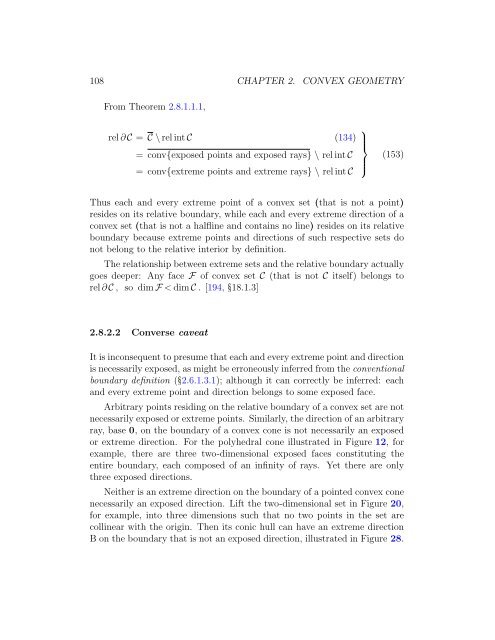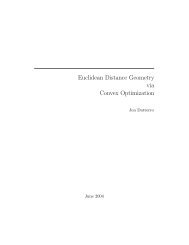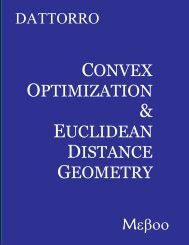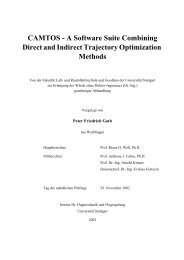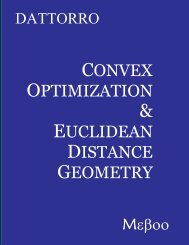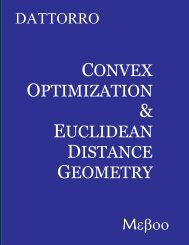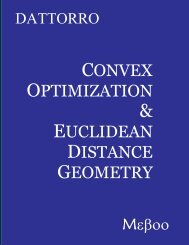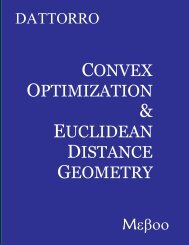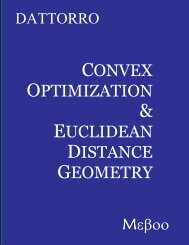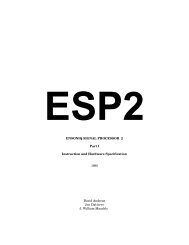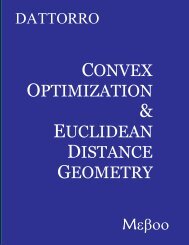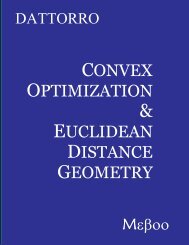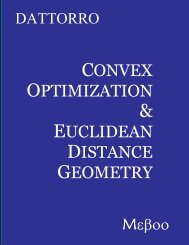- Page 1 and 2:
DATTORROCONVEXOPTIMIZATION&EUCLIDEA
- Page 3 and 4:
Mεβoo Publishing
- Page 5 and 6:
Convex Optimization&Euclidean Dista
- Page 7 and 8:
Convex Optimization&Euclidean Dista
- Page 9 and 10:
for Jennie Columba♦Antonio♦♦&
- Page 11 and 12:
PreludeThe constant demands of my d
- Page 13 and 14:
Convex Optimization&Euclidean Dista
- Page 15 and 16:
CONVEX OPTIMIZATION & EUCLIDEAN DIS
- Page 17 and 18:
CONVEX OPTIMIZATION & EUCLIDEAN DIS
- Page 19 and 20:
CONVEX OPTIMIZATION & EUCLIDEAN DIS
- Page 21 and 22:
CONVEX OPTIMIZATION & EUCLIDEAN DIS
- Page 23 and 24:
CONVEX OPTIMIZATION & EUCLIDEAN DIS
- Page 25 and 26:
CONVEX OPTIMIZATION & EUCLIDEAN DIS
- Page 27 and 28:
List of Figures1 Overview 331 Cocoo
- Page 29 and 30:
LIST OF FIGURES 294 Euclidean Dista
- Page 31:
List of Tables2 Convex GeometryTabl
- Page 34 and 35:
34 CHAPTER 1. OVERVIEWFigure 1: Coc
- Page 36 and 37:
36 CHAPTER 1. OVERVIEWAbsolute posi
- Page 38 and 39:
38 CHAPTER 1. OVERVIEWFigure 4: Thi
- Page 40 and 41:
40 CHAPTER 1. OVERVIEWoriginalrecon
- Page 42 and 43:
42 CHAPTER 1. OVERVIEWWe characteri
- Page 44 and 45:
44 CHAPTER 1. OVERVIEWEight appendi
- Page 46 and 47:
46 CHAPTER 2. CONVEX GEOMETRY2.1 Co
- Page 48 and 49:
48 CHAPTER 2. CONVEX GEOMETRY2.1.3
- Page 50 and 51:
50 CHAPTER 2. CONVEX GEOMETRY(a)R(b
- Page 52 and 53:
52 CHAPTER 2. CONVEX GEOMETRYwhere
- Page 54 and 55:
54 CHAPTER 2. CONVEX GEOMETRYNow le
- Page 56 and 57:
56 CHAPTER 2. CONVEX GEOMETRY2.1.9
- Page 58 and 59: 58 CHAPTER 2. CONVEX GEOMETRYand wh
- Page 60 and 61: 60 CHAPTER 2. CONVEX GEOMETRY2.2.1.
- Page 62 and 63: 62 CHAPTER 2. CONVEX GEOMETRYwhere
- Page 64 and 65: 64 CHAPTER 2. CONVEX GEOMETRYAny ma
- Page 66 and 67: 66 CHAPTER 2. CONVEX GEOMETRYIn par
- Page 68 and 69: 68 CHAPTER 2. CONVEX GEOMETRY2.3.2
- Page 70 and 71: 70 CHAPTER 2. CONVEX GEOMETRY2.3.2.
- Page 72 and 73: 72 CHAPTER 2. CONVEX GEOMETRYBy con
- Page 74 and 75: 74 CHAPTER 2. CONVEX GEOMETRYH −
- Page 76 and 77: 76 CHAPTER 2. CONVEX GEOMETRY2.4.2
- Page 78 and 79: 78 CHAPTER 2. CONVEX GEOMETRYA 1A 2
- Page 80 and 81: 80 CHAPTER 2. CONVEX GEOMETRYCH −
- Page 82 and 83: 82 CHAPTER 2. CONVEX GEOMETRY2.4.2.
- Page 84 and 85: 84 CHAPTER 2. CONVEX GEOMETRYMany o
- Page 86 and 87: 86 CHAPTER 2. CONVEX GEOMETRY2.5.1
- Page 88 and 89: 88 CHAPTER 2. CONVEX GEOMETRY2.5.2
- Page 90 and 91: 90 CHAPTER 2. CONVEX GEOMETRYABCDFi
- Page 92 and 93: 92 CHAPTER 2. CONVEX GEOMETRY2.6.1.
- Page 94 and 95: 94 CHAPTER 2. CONVEX GEOMETRYX(a)00
- Page 96 and 97: 96 CHAPTER 2. CONVEX GEOMETRYXXFigu
- Page 98 and 99: 98 CHAPTER 2. CONVEX GEOMETRYFamili
- Page 100 and 101: 100 CHAPTER 2. CONVEX GEOMETRYThe v
- Page 102 and 103: 102 CHAPTER 2. CONVEX GEOMETRYPrope
- Page 104 and 105: 104 CHAPTER 2. CONVEX GEOMETRYthe s
- Page 106 and 107: 106 CHAPTER 2. CONVEX GEOMETRY2.8.2
- Page 110 and 111: 110 CHAPTER 2. CONVEX GEOMETRYThe o
- Page 112 and 113: 112 CHAPTER 2. CONVEX GEOMETRYCXFig
- Page 114 and 115: 114 CHAPTER 2. CONVEX GEOMETRYis a
- Page 116 and 117: 116 CHAPTER 2. CONVEX GEOMETRY2.9.2
- Page 118 and 119: 118 CHAPTER 2. CONVEX GEOMETRYmatri
- Page 120 and 121: 120 CHAPTER 2. CONVEX GEOMETRY2.9.2
- Page 122 and 123: 122 CHAPTER 2. CONVEX GEOMETRY0-1-0
- Page 124 and 125: 124 CHAPTER 2. CONVEX GEOMETRYposit
- Page 126 and 127: 126 CHAPTER 2. CONVEX GEOMETRY2.9.2
- Page 128 and 129: 128 CHAPTER 2. CONVEX GEOMETRY2.9.3
- Page 130 and 131: 130 CHAPTER 2. CONVEX GEOMETRY000(a
- Page 132 and 133: 132 CHAPTER 2. CONVEX GEOMETRYK(a)K
- Page 134 and 135: 134 CHAPTER 2. CONVEX GEOMETRYHx 2x
- Page 136 and 137: 136 CHAPTER 2. CONVEX GEOMETRY2.12
- Page 138 and 139: 138 CHAPTER 2. CONVEX GEOMETRYsubsp
- Page 140 and 141: 140 CHAPTER 2. CONVEX GEOMETRY2.12.
- Page 142 and 143: 142 CHAPTER 2. CONVEX GEOMETRYS= co
- Page 144 and 145: 144 CHAPTER 2. CONVEX GEOMETRY
- Page 146 and 147: 146 CHAPTER 2. CONVEX GEOMETRYis a
- Page 148 and 149: 148 CHAPTER 2. CONVEX GEOMETRYR 2 R
- Page 150 and 151: 150 CHAPTER 2. CONVEX GEOMETRYwhich
- Page 152 and 153: 152 CHAPTER 2. CONVEX GEOMETRYK is
- Page 154 and 155: 154 CHAPTER 2. CONVEX GEOMETRYKK
- Page 156 and 157: 156 CHAPTER 2. CONVEX GEOMETRYWhen
- Page 158 and 159:
158 CHAPTER 2. CONVEX GEOMETRYAy
- Page 160 and 161:
160 CHAPTER 2. CONVEX GEOMETRYwhere
- Page 162 and 163:
162 CHAPTER 2. CONVEX GEOMETRY2.13.
- Page 164 and 165:
164 CHAPTER 2. CONVEX GEOMETRY2.13.
- Page 166 and 167:
166 CHAPTER 2. CONVEX GEOMETRY2.13.
- Page 168 and 169:
168 CHAPTER 2. CONVEX GEOMETRYΓ 4
- Page 170 and 171:
170 CHAPTER 2. CONVEX GEOMETRYCoord
- Page 172 and 173:
172 CHAPTER 2. CONVEX GEOMETRYunder
- Page 174 and 175:
174 CHAPTER 2. CONVEX GEOMETRYWhen
- Page 176:
176 CHAPTER 2. CONVEX GEOMETRYFor e
- Page 184 and 185:
184 CHAPTER 2. CONVEX GEOMETRY2.13.
- Page 186 and 187:
186 CHAPTER 2. CONVEX GEOMETRY2.13.
- Page 188 and 189:
188 CHAPTER 2. CONVEX GEOMETRYwhere
- Page 190 and 191:
190 CHAPTER 2. CONVEX GEOMETRY
- Page 192 and 193:
192 CHAPTER 3. GEOMETRY OF CONVEX F
- Page 194 and 195:
194 CHAPTER 3. GEOMETRY OF CONVEX F
- Page 196 and 197:
196 CHAPTER 3. GEOMETRY OF CONVEX F
- Page 198 and 199:
198 CHAPTER 3. GEOMETRY OF CONVEX F
- Page 200 and 201:
200 CHAPTER 3. GEOMETRY OF CONVEX F
- Page 202 and 203:
202 CHAPTER 3. GEOMETRY OF CONVEX F
- Page 204 and 205:
204 CHAPTER 3. GEOMETRY OF CONVEX F
- Page 206 and 207:
206 CHAPTER 3. GEOMETRY OF CONVEX F
- Page 208 and 209:
208 CHAPTER 3. GEOMETRY OF CONVEX F
- Page 210 and 211:
210 CHAPTER 3. GEOMETRY OF CONVEX F
- Page 212 and 213:
212 CHAPTER 3. GEOMETRY OF CONVEX F
- Page 214 and 215:
214 CHAPTER 3. GEOMETRY OF CONVEX F
- Page 216 and 217:
216 CHAPTER 4. EUCLIDEAN DISTANCE M
- Page 218 and 219:
218 CHAPTER 4. EUCLIDEAN DISTANCE M
- Page 220 and 221:
220 CHAPTER 4. EUCLIDEAN DISTANCE M
- Page 222 and 223:
222 CHAPTER 4. EUCLIDEAN DISTANCE M
- Page 224 and 225:
224 CHAPTER 4. EUCLIDEAN DISTANCE M
- Page 226 and 227:
226 CHAPTER 4. EUCLIDEAN DISTANCE M
- Page 228 and 229:
228 CHAPTER 4. EUCLIDEAN DISTANCE M
- Page 230 and 231:
230 CHAPTER 4. EUCLIDEAN DISTANCE M
- Page 232 and 233:
232 CHAPTER 4. EUCLIDEAN DISTANCE M
- Page 234 and 235:
234 CHAPTER 4. EUCLIDEAN DISTANCE M
- Page 236 and 237:
236 CHAPTER 4. EUCLIDEAN DISTANCE M
- Page 238 and 239:
238 CHAPTER 4. EUCLIDEAN DISTANCE M
- Page 240 and 241:
240 CHAPTER 4. EUCLIDEAN DISTANCE M
- Page 242 and 243:
242 CHAPTER 4. EUCLIDEAN DISTANCE M
- Page 244 and 245:
244 CHAPTER 4. EUCLIDEAN DISTANCE M
- Page 246 and 247:
246 CHAPTER 4. EUCLIDEAN DISTANCE M
- Page 248 and 249:
248 CHAPTER 4. EUCLIDEAN DISTANCE M
- Page 250 and 251:
250 CHAPTER 4. EUCLIDEAN DISTANCE M
- Page 252 and 253:
252 CHAPTER 4. EUCLIDEAN DISTANCE M
- Page 254 and 255:
254 CHAPTER 4. EUCLIDEAN DISTANCE M
- Page 256 and 257:
256 CHAPTER 4. EUCLIDEAN DISTANCE M
- Page 258 and 259:
258 CHAPTER 4. EUCLIDEAN DISTANCE M
- Page 260 and 261:
260 CHAPTER 4. EUCLIDEAN DISTANCE M
- Page 262 and 263:
262 CHAPTER 4. EUCLIDEAN DISTANCE M
- Page 264 and 265:
264 CHAPTER 4. EUCLIDEAN DISTANCE M
- Page 266 and 267:
266 CHAPTER 4. EUCLIDEAN DISTANCE M
- Page 268 and 269:
268 CHAPTER 4. EUCLIDEAN DISTANCE M
- Page 270 and 271:
270 CHAPTER 4. EUCLIDEAN DISTANCE M
- Page 272 and 273:
272 CHAPTER 4. EUCLIDEAN DISTANCE M
- Page 274 and 275:
274 CHAPTER 4. EUCLIDEAN DISTANCE M
- Page 276 and 277:
276 CHAPTER 4. EUCLIDEAN DISTANCE M
- Page 278 and 279:
278 CHAPTER 4. EUCLIDEAN DISTANCE M
- Page 280 and 281:
280 CHAPTER 4. EUCLIDEAN DISTANCE M
- Page 282 and 283:
282 CHAPTER 4. EUCLIDEAN DISTANCE M
- Page 284 and 285:
284 CHAPTER 4. EUCLIDEAN DISTANCE M
- Page 286 and 287:
286 CHAPTER 4. EUCLIDEAN DISTANCE M
- Page 288 and 289:
288 CHAPTER 4. EUCLIDEAN DISTANCE M
- Page 290 and 291:
290 CHAPTER 4. EUCLIDEAN DISTANCE M
- Page 292 and 293:
292 CHAPTER 4. EUCLIDEAN DISTANCE M
- Page 294 and 295:
294 CHAPTER 4. EUCLIDEAN DISTANCE M
- Page 296 and 297:
296 CHAPTER 4. EUCLIDEAN DISTANCE M
- Page 298 and 299:
298 CHAPTER 4. EUCLIDEAN DISTANCE M
- Page 300 and 301:
300 CHAPTER 4. EUCLIDEAN DISTANCE M
- Page 302 and 303:
302 CHAPTER 4. EUCLIDEAN DISTANCE M
- Page 304 and 305:
304 CHAPTER 4. EUCLIDEAN DISTANCE M
- Page 306 and 307:
306 CHAPTER 5. EDM CONE5.1 Defining
- Page 308 and 309:
308 CHAPTER 5. EDM CONEThis cone is
- Page 310 and 311:
310 CHAPTER 5. EDM CONEN = 4. Relat
- Page 312 and 313:
312 CHAPTER 5. EDM CONE5.4 a geomet
- Page 314 and 315:
314 CHAPTER 5. EDM CONE(a)(b)Figure
- Page 316 and 317:
316 CHAPTER 5. EDM CONEFigure 78: T
- Page 318 and 319:
318 CHAPTER 5. EDM CONEProof. Next
- Page 320 and 321:
320 CHAPTER 5. EDM CONETo prove tha
- Page 322 and 323:
322 CHAPTER 5. EDM CONE{D ∈ EDM N
- Page 324 and 325:
324 CHAPTER 5. EDM CONED = δ ( −
- Page 326 and 327:
326 CHAPTER 5. EDM CONE5.6 Correspo
- Page 328 and 329:
328 CHAPTER 5. EDM CONE5.6.0.0.2 Ex
- Page 330 and 331:
330 CHAPTER 5. EDM CONE5.6.2.0.1 Ex
- Page 332 and 333:
332 CHAPTER 5. EDM CONEThe set of a
- Page 334 and 335:
334 CHAPTER 5. EDM CONEsvec ∂ S 2
- Page 336 and 337:
336 CHAPTER 5. EDM CONEWhen the Fin
- Page 338 and 339:
338 CHAPTER 5. EDM CONEProof. First
- Page 340 and 341:
340 CHAPTER 5. EDM CONEEDM 2 = S 2
- Page 342 and 343:
342 CHAPTER 5. EDM CONEwhose veraci
- Page 344 and 345:
344 CHAPTER 5. EDM CONED ◦ = δ(D
- Page 346 and 347:
346 CHAPTER 5. EDM CONEcone; id est
- Page 348 and 349:
348 CHAPTER 5. EDM CONE5.8.1.7 Scho
- Page 350 and 351:
350 CHAPTER 5. EDM CONETo find the
- Page 352 and 353:
352 CHAPTER 5. EDM CONEWhen D is an
- Page 354 and 355:
354 CHAPTER 6. SEMIDEFINITE PROGRAM
- Page 356 and 357:
356 CHAPTER 6. SEMIDEFINITE PROGRAM
- Page 358 and 359:
358 CHAPTER 6. SEMIDEFINITE PROGRAM
- Page 360 and 361:
360 CHAPTER 6. SEMIDEFINITE PROGRAM
- Page 362 and 363:
362 CHAPTER 6. SEMIDEFINITE PROGRAM
- Page 364 and 365:
364 CHAPTER 6. SEMIDEFINITE PROGRAM
- Page 366 and 367:
366 CHAPTER 6. SEMIDEFINITE PROGRAM
- Page 368 and 369:
368 CHAPTER 6. SEMIDEFINITE PROGRAM
- Page 370 and 371:
370 CHAPTER 6. SEMIDEFINITE PROGRAM
- Page 372 and 373:
372 CHAPTER 6. SEMIDEFINITE PROGRAM
- Page 374 and 375:
374 CHAPTER 6. SEMIDEFINITE PROGRAM
- Page 376 and 377:
376 CHAPTER 6. SEMIDEFINITE PROGRAM
- Page 378 and 379:
378 CHAPTER 6. SEMIDEFINITE PROGRAM
- Page 380 and 381:
380 CHAPTER 6. SEMIDEFINITE PROGRAM
- Page 382 and 383:
382 CHAPTER 6. SEMIDEFINITE PROGRAM
- Page 384 and 385:
384 CHAPTER 6. SEMIDEFINITE PROGRAM
- Page 386 and 387:
386 CHAPTER 6. SEMIDEFINITE PROGRAM
- Page 388 and 389:
388 CHAPTER 7. EDM PROXIMITY7.0.1 M
- Page 390 and 391:
390 CHAPTER 7. EDM PROXIMITY......
- Page 392 and 393:
392 CHAPTER 7. EDM PROXIMITYAny pro
- Page 394 and 395:
394 CHAPTER 7. EDM PROXIMITYSubstit
- Page 396 and 397:
396 CHAPTER 7. EDM PROXIMITY7.1.1 C
- Page 398 and 399:
398 CHAPTER 7. EDM PROXIMITYdimensi
- Page 400 and 401:
400 CHAPTER 7. EDM PROXIMITYGiven
- Page 402 and 403:
402 CHAPTER 7. EDM PROXIMITYProblem
- Page 404 and 405:
404 CHAPTER 7. EDM PROXIMITYBecause
- Page 406 and 407:
406 CHAPTER 7. EDM PROXIMITY7.2.1 C
- Page 408 and 409:
408 CHAPTER 7. EDM PROXIMITY7.2.1.2
- Page 410 and 411:
410 CHAPTER 7. EDM PROXIMITY7.2.2.2
- Page 412 and 413:
412 CHAPTER 7. EDM PROXIMITYTo see
- Page 414 and 415:
414 CHAPTER 7. EDM PROXIMITY∑mini
- Page 416 and 417:
416 CHAPTER 7. EDM PROXIMITYcharact
- Page 418 and 419:
418 CHAPTER 7. EDM PROXIMITY7.3.3.1
- Page 420 and 421:
420 CHAPTER 7. EDM PROXIMITYwhere
- Page 422 and 423:
422 CHAPTER 7. EDM PROXIMITY
- Page 424 and 425:
424 APPENDIX A. LINEAR ALGEBRAA.1.1
- Page 426 and 427:
426 APPENDIX A. LINEAR ALGEBRA27. T
- Page 428 and 429:
428 APPENDIX A. LINEAR ALGEBRAonly
- Page 430 and 431:
430 APPENDIX A. LINEAR ALGEBRA(AB)
- Page 432 and 433:
432 APPENDIX A. LINEAR ALGEBRAA.3.1
- Page 434 and 435:
434 APPENDIX A. LINEAR ALGEBRA(Fan)
- Page 436 and 437:
436 APPENDIX A. LINEAR ALGEBRAFor A
- Page 438 and 439:
438 APPENDIX A. LINEAR ALGEBRAFor A
- Page 440 and 441:
440 APPENDIX A. LINEAR ALGEBRAA.3.1
- Page 442 and 443:
442 APPENDIX A. LINEAR ALGEBRAA.4 S
- Page 444 and 445:
444 APPENDIX A. LINEAR ALGEBRAA.4.0
- Page 446 and 447:
446 APPENDIX A. LINEAR ALGEBRAA.4.1
- Page 448 and 449:
448 APPENDIX A. LINEAR ALGEBRAA.5 e
- Page 450 and 451:
450 APPENDIX A. LINEAR ALGEBRAs i w
- Page 452 and 453:
452 APPENDIX A. LINEAR ALGEBRAA.6.2
- Page 454 and 455:
454 APPENDIX A. LINEAR ALGEBRAΣq 2
- Page 456 and 457:
456 APPENDIX A. LINEAR ALGEBRAA.7 Z
- Page 458 and 459:
458 APPENDIX A. LINEAR ALGEBRAThe r
- Page 460 and 461:
460 APPENDIX A. LINEAR ALGEBRAThe p
- Page 462 and 463:
462 APPENDIX B. SIMPLE MATRICESB.1
- Page 464 and 465:
464 APPENDIX B. SIMPLE MATRICESB.1.
- Page 466 and 467:
466 APPENDIX B. SIMPLE MATRICESB.1.
- Page 468 and 469:
468 APPENDIX B. SIMPLE MATRICESN(u
- Page 470 and 471:
470 APPENDIX B. SIMPLE MATRICESDue
- Page 472 and 473:
472 APPENDIX B. SIMPLE MATRICESB.4.
- Page 474 and 475:
474 APPENDIX B. SIMPLE MATRICEShas
- Page 476 and 477:
476 APPENDIX B. SIMPLE MATRICESFigu
- Page 478 and 479:
478 APPENDIX B. SIMPLE MATRICESB.5.
- Page 480 and 481:
480 APPENDIX C. SOME ANALYTICAL OPT
- Page 482 and 483:
482 APPENDIX C. SOME ANALYTICAL OPT
- Page 484 and 485:
484 APPENDIX C. SOME ANALYTICAL OPT
- Page 486 and 487:
486 APPENDIX C. SOME ANALYTICAL OPT
- Page 488 and 489:
488 APPENDIX C. SOME ANALYTICAL OPT
- Page 490 and 491:
490 APPENDIX C. SOME ANALYTICAL OPT
- Page 493:
C.5. TWO-SIDED ORTHOGONAL PROCRUSTE
- Page 496 and 497:
496 APPENDIX D. MATRIX CALCULUSThe
- Page 498 and 499:
498 APPENDIX D. MATRIX CALCULUSGrad
- Page 500 and 501:
500 APPENDIX D. MATRIX CALCULUSBeca
- Page 502 and 503:
502 APPENDIX D. MATRIX CALCULUSfrom
- Page 504 and 505:
504 APPENDIX D. MATRIX CALCULUSin m
- Page 506 and 507:
506 APPENDIX D. MATRIX CALCULUSFigu
- Page 508 and 509:
508 APPENDIX D. MATRIX CALCULUS⎡
- Page 510 and 511:
510 APPENDIX D. MATRIX CALCULUSD.1.
- Page 512 and 513:
512 APPENDIX D. MATRIX CALCULUSD.1.
- Page 514 and 515:
514 APPENDIX D. MATRIX CALCULUSD.2
- Page 516 and 517:
516 APPENDIX D. MATRIX CALCULUSAlge
- Page 518 and 519:
518 APPENDIX D. MATRIX CALCULUSTrac
- Page 520 and 521:
520 APPENDIX D. MATRIX CALCULUSD.2.
- Page 522 and 523:
522 APPENDIX D. MATRIX CALCULUS
- Page 524 and 525:
524 APPENDIX E. PROJECTIONThe follo
- Page 526 and 527:
526 APPENDIX E. PROJECTIONE.1.1Bior
- Page 528 and 529:
528 APPENDIX E. PROJECTIONTxT ⊥ R
- Page 530 and 531:
530 APPENDIX E. PROJECTIONE.2 I−P
- Page 532 and 533:
532 APPENDIX E. PROJECTIONIn any ca
- Page 534 and 535:
534 APPENDIX E. PROJECTIONProof. We
- Page 536 and 537:
536 APPENDIX E. PROJECTIONthe direc
- Page 538 and 539:
538 APPENDIX E. PROJECTIONand defin
- Page 540 and 541:
540 APPENDIX E. PROJECTIONnonorthog
- Page 542 and 543:
542 APPENDIX E. PROJECTIONwhere y p
- Page 544 and 545:
544 APPENDIX E. PROJECTIONE.6.2Nono
- Page 546 and 547:
546 APPENDIX E. PROJECTIONE.6.3Orth
- Page 548 and 549:
548 APPENDIX E. PROJECTIONE.6.4.1.1
- Page 550 and 551:
550 APPENDIX E. PROJECTIONBy (1537)
- Page 552 and 553:
552 APPENDIX E. PROJECTIONAs for al
- Page 554 and 555:
554 APPENDIX E. PROJECTIONcharacter
- Page 556 and 557:
556 APPENDIX E. PROJECTIONE.9.0.0.1
- Page 558 and 559:
558 APPENDIX E. PROJECTION∂H −C
- Page 560 and 561:
560 APPENDIX E. PROJECTIONE.9.2.0.1
- Page 562 and 563:
562 APPENDIX E. PROJECTIONNow assum
- Page 564 and 565:
564 APPENDIX E. PROJECTIONProof. [3
- Page 566 and 567:
566 APPENDIX E. PROJECTION❇❇❇
- Page 568 and 569:
568 APPENDIX E. PROJECTIONE.10 Alte
- Page 570 and 571:
570 APPENDIX E. PROJECTIONbH 1H 2P
- Page 572 and 573:
572 APPENDIX E. PROJECTIONa(a)C 1C
- Page 574 and 575:
574 APPENDIX E. PROJECTION(a feasib
- Page 576 and 577:
576 APPENDIX E. PROJECTIONwhile, th
- Page 578 and 579:
578 APPENDIX E. PROJECTIONThe dista
- Page 580 and 581:
580 APPENDIX E. PROJECTION⎡⎢⎣
- Page 582 and 583:
582 APPENDIX E. PROJECTIONK ⊥ H 1
- Page 584 and 585:
584 APPENDIX E. PROJECTION
- Page 586 and 587:
586 APPENDIX F. PROOF OF EDM COMPOS
- Page 588 and 589:
588 APPENDIX F. PROOF OF EDM COMPOS
- Page 590 and 591:
590 APPENDIX G. MATLAB PROGRAMSif n
- Page 592 and 593:
592 APPENDIX G. MATLAB PROGRAMSend%
- Page 594 and 595:
594 APPENDIX G. MATLAB PROGRAMSG.1.
- Page 596 and 597:
596 APPENDIX G. MATLAB PROGRAMScoun
- Page 598 and 599:
598 APPENDIX G. MATLAB PROGRAMSG.3
- Page 600 and 601:
600 APPENDIX G. MATLAB PROGRAMSG.3.
- Page 602 and 603:
602 APPENDIX G. MATLAB PROGRAMSf(id
- Page 604 and 605:
604 APPENDIX G. MATLAB PROGRAMS%try
- Page 606 and 607:
606 APPENDIX G. MATLAB PROGRAMSG.4.
- Page 608 and 609:
608 APPENDIX H. NOTATION AND A FEW
- Page 610 and 611:
610 APPENDIX H. NOTATION AND A FEW
- Page 612 and 613:
612 APPENDIX H. NOTATION AND A FEW
- Page 614 and 615:
614 APPENDIX H. NOTATION AND A FEW
- Page 616 and 617:
616 APPENDIX H. NOTATION AND A FEW
- Page 618 and 619:
618 APPENDIX H. NOTATION AND A FEW
- Page 620 and 621:
620 APPENDIX H. NOTATION AND A FEW
- Page 622 and 623:
622 BIBLIOGRAPHY[7] Abdo Y. Alfakih
- Page 624 and 625:
624 BIBLIOGRAPHY[29] Pratik Biswas,
- Page 626 and 627:
626 BIBLIOGRAPHY[51] Frank Critchle
- Page 628 and 629:
628 BIBLIOGRAPHY[70] Ivar Ekeland a
- Page 630 and 631:
630 BIBLIOGRAPHY[91] John Clifford
- Page 632 and 633:
632 BIBLIOGRAPHYnew software CANDID
- Page 634 and 635:
634 BIBLIOGRAPHY[133] Florian Jarre
- Page 636 and 637:
636 BIBLIOGRAPHY[155] David G. Luen
- Page 638 and 639:
638 BIBLIOGRAPHY[178] Brad Osgood.
- Page 640 and 641:
640 BIBLIOGRAPHY[198] Uwe Schäfer.
- Page 642 and 643:
642 BIBLIOGRAPHY[222] Akimichi Take
- Page 644 and 645:
644 BIBLIOGRAPHY[244] Eric W. Weiss
- Page 646 and 647:
646 BIBLIOGRAPHY
- Page 648 and 649:
648
- Page 650 and 651:
650
- Page 652 and 653:
652
- Page 654:
654


